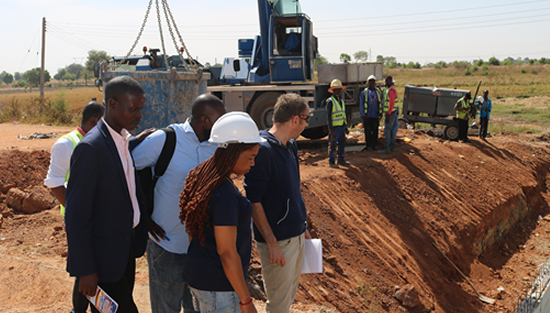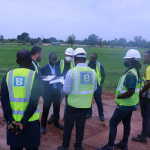Cleen Foundation, an NGO, says it is set to commence its 3rd quarter monitoring of the Federal Government Infrastructural projects in the Eastern, Western and Northern parts of the country.
Mrs Ruth Olofin, Acting Executive Director of the foundation said this at a news conference on “Monitoring the Utilisation of Forfeited Assets in Nigeria”, held in Abuja.
Olofin said that while leveraging on the increased level of cooperation between the cleen monitoring consortium, the projects contractors, Nigeria Sovereign Investment Authority, and the Federal Ministry of Justice.
“The monitoring group are embarking on its third quarterly visitations to the Three project site locations from the 15th to 27th of November 2021.
“Twenty nine Nigerian citizens domiciled in localities close to the project locations where work is being performed have being trained on the methodology to undertake the monitoring functions including the cleen project team.
“The monitors have been deployed to undertake unscheduled visits to the construction locations.
“And the project locations being monitored cut across Eight states namely Oyo, Ogun, Lagos, Delta, Anambra, FCT (Abuja), Kaduna and Kano,” she said.
“The monitoring team were working to ensure that the forfeited funds worth $311.8million will be for the benefit of the Nigerian people for its assigned infrastructural development,” she said.
Olofin said that the cleen foundation on the 10th of February 2021 was appointed by the Federal Government of Nigeria, the U.S Government and the Bailiwick of Jersey based on the trilateral agreement signed among Nigeria, U.S and the Balwick of Jersey as the civil society organisation to provide effectivemonitoring.
According to her, the foundation is to monitor for the implementation of the tripartite agreement on the sharing, transfer, disposition, repatriation, and management of certain forfeited assets.
“Cleen foundation and her consortium partners, FTI Consulting headquarteredin Washington DC, U.S who are renowned specialists in asset tracing andrecovery, risk assessments, forensic, and others are required to monitor the utilisation of the forfeited assets.
“Cleen foundation and her consortium partners upon an agreed program of works with the Nigeria Sovereign Investment Authority and Responsible Contractors spanning from June 2021 to March 2022 embarked on series of on-the-spot checks and unscheduled visits to these locations.
“During monitoring, workers were on site, construction activities are ongoing, and each of the project offices are staffed and operational.
“The Monitoring team was mot timely and without incident by the EPC Contractorswho were suitably prepared and offered appropriate comprehensive updates on thenature and progress of works at each of the site locations.
“The quality of work observed appears to be consistent with acceptable standards and there were simultaneous ongoing construction activities on both sides of the dual carriageway of the Abuja-Kano Road, sections of the Second River Niger Bridge, and the Lagos-Ibadan Expressway,” she said.
She commended contractors of the Three forfeited assets infrastructure projects for upholding best construction practices.
“Examples of infrastructures built when we conducted our monitoring activities include but are not limited to the following; Median Barrier, Road Drainage, Main Carriageway, and Remedial Work “road markings, grass planting,” she said.
Olofin said that the cleen monitoring consortium during her monitoring visitations to the project site locations in June 2021 in relation to the forfeited assets, observed that work is progressing at each project location and at good standards.
She added that the means and methods used by the EPC Contractors, especially at the Second River Niger Bridge, appeared to be innovative.
She also said that for the Second River Niger Bridge, Julius Berger Construction company demonstrated good innovation using geotextile, given that the secondary road subgrades were weak.
She noted that the construction method and value engineering has several benefits that include accelerating the construction time, increasing the road lifespan and durability, and reducing the need for frequent maintenance.
“In addition, the cold recycling method which promotes effective cost management isanother valued engineering method by Julius Berger Nigeria at the Abuja-Kano Road,” she said.
She said that a total of 450 unscheduled visits have been undertaken to the three project locations on a two quarterly site visits since the commencement of the project in June 2021.
Olofin noted that the scope of work are inclusive and not limited to compliance with regards to anti-corruption, anti-human trafficking procurement practices, forensic auditing, engineering and infrastructure.
She urged the Nigeria Sovereign Investment Authority to live up to its responsibility to supervise the utilization of funds by Julius Berger Nigeria PLC and Reynolds Construction Company who were contracted by the Federal Ministry of Works and Housing.
According to reports, the forfeited assets amounting to N126 billion is being spent on three projects that cut across three zones of the country equally.
N42 billion naira for the Lagos-Ibadan expressway, N42 billion for the second Niger bridge; and N42 billion for the Abuja-Kano Road.
The rehabilitation of the Lagos to Ibadan Expressway was awarded to two EPC Contractors, the Reynolds Construction Company Ltd. (RCC), and Julius Berger Ltd.(JBL).
While Reynolds Construction Company is responsible for Section two of the Lagos- Ibadan Expressway (Sagamu-Ibadan), Julius Berger Nigeria Limited is responsible for Section one of the Lagos-Ibadan Expressway (Lagos-Sagamu axis), Second River Niger Bridge and the Abuja-Kano Road.



